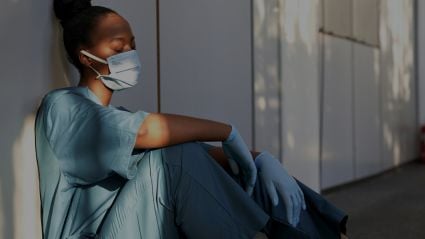
A prison sentence should not become a potential death sentence. Yet, as the coronavirus pandemic ravages the United States, that possibility is becoming more realistic for the more than 2.3 million locked behind bars with little, if any, protection against the virus.
More than half are locked up for nonviolent or drug-related offenses. Others might not be able to make bail for simple offenses, endangering the lives of both the incarcerated individuals and the correctional employees tasked with ensuring the health and safety of their facilities. Visitors and employees are unwittingly bringing in this virus and other diseases to the incarcerated, who are helpless to defend themselves.
As the US faces its most dire public health crisis in more than a century, cities and states are locking down to help slow the spread of COVID-19. While millions are voluntarily staying in place or practicing social distancing for essential trips outside, millions in prison have no choice but to stay in correctional facilities, unable to see their spouses, children, family, and friends, further isolating them in an even more solitary situation. Cramped and potentially unsanitary correctional facilities present a dangerous combination, converting a simple prison sentence into a death sentence, potentially violating the Eighth Amendment’s prohibition of cruel and unusual punishment.
Incarcerated or not, any death from COVID-19 is a tragedy, and one that could have been potentially prevented through early release or another mitigatory approach is even more grievous. The over-sentencing and over-incarceration of nonviolent offenders is already tragic. Needlessly endangering the lives of millions by exposing them to a virus that, as of this writing, in the US alone has sickened 558,526 individuals and killed 22,146 is even more appalling.
That frightening scenario is already happening in our jails, prisons, and other correctional facilities. One need only look at the dire situation in New York City's prisons to see how many lives are seriously at stake. That's why, especially in these uncertain and challenging times, it is more important than ever for government and public health officials to prioritize the health of everyone in the criminal justice system, enabling the early release of low-risk individuals to their families and properly enacting quarantine and sanitation practices for those who remain under their charge.
During the first few weeks of the pandemic in the US, prisons and jails in multiple counties and states have released thousands of people to lessen the deadly risk of COVID-19 among the most vulnerable populations, namely the elderly and those with underlying medical conditions. Pennsylvania officials chose to quarantine the state's entire prison population across 25 facilities after identifying one case. The Federal Bureau of Prisons enacted a similar 14-day quarantine, effective April 1.
The coronavirus pandemic has shown the world no mercy, and difficult days are undoubtedly ahead, but we must not abandon our principles. We must show mercy and compassion for all, especially for the most vulnerable.
While these measures are well intentioned, they are woefully insufficient half-measures given the virus’ rapid spread. The time for bold action is now. Policymakers must do all in their power to help federal and state officials acquire testing kits and personal protective equipment in order to better identify where it is spreading and to further prevent its transmission among employees and inmates alike. We also need to aggressively use tools like home confinement, clemencies, and compassionate release immediately for those who qualify.
President Donald Trump has said that his administration would strongly examine releasing at-risk federal inmates convicted of nonviolent offenses. Sadly, it is too late for Patrick Jones, the 49-year-old man incarcerated for crack cocaine convictions who died at a federal facility in Louisiana in late March. Jones never had the opportunity to see the outside of prison walls, despite filing for an appeal for a reduced sentence mere weeks before his passing.
The coronavirus pandemic has shown the world no mercy, and difficult days are undoubtedly ahead, but we must not abandon our principles. We must show mercy and compassion for all, especially for the most vulnerable. People in prison are already socially distanced from society, many by overly harsh and punitive sentences that do little to improve public safety. Keeping one another safe, we must remember to advocate on behalf of the incarcerated. Doing so will not only flatten the curve but also, to paraphrase Martin Luther King, Jr., bend the arc of the moral universe toward justice.















